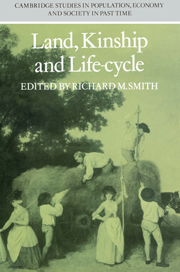Book contents
- Frontmatter
- Contents
- List of contributors
- Preface
- 1 Some issues concerning families and their property in rural England 1250–1800
- 2 Population pressure, inheritance and the land market in a fourteenth-century peasant community
- 3 Families and their land in an area of partible inheritance: Redgrave, Suffolk 1260–1320
- 4 Population changes and the transfer of customary land on a Cambridgeshire manor in the fourteenth century
- 5 Industrial employment and the rural land market 1380– 1520
- 6 Changes in the size of peasant holdings in some west midland villages 1400–1540
- 7 The erosion of the family–land bond in the late fourteenth and fifteenth centuries: a methodological note
- 8 Changes in the link between families and land in the west midlands in the fourteenth and fifteenth centuries
- 9 Kinship in an English village: Terling, Essex 1550–1700
- 10 The myth of the peasantry: family and economy in a northern parish
- 11 Poverty, poor relief and the life-cycle: some evidence from seventeenth-century Norfolk
- 12 The receipt of poor relief and family situation: Aldenham, Hertfordshire 1630–90
- 13 Widows in pre-industrial society: an essay upon their economic functions
- 14 Real property, marriage and children: the evidence from four pre-industrial communities
- 15 The nineteenth-century peasantry of Melbourn, Cambridgeshire
- Consolidated Bibliography
- Index
13 - Widows in pre-industrial society: an essay upon their economic functions
Published online by Cambridge University Press: 19 October 2009
- Frontmatter
- Contents
- List of contributors
- Preface
- 1 Some issues concerning families and their property in rural England 1250–1800
- 2 Population pressure, inheritance and the land market in a fourteenth-century peasant community
- 3 Families and their land in an area of partible inheritance: Redgrave, Suffolk 1260–1320
- 4 Population changes and the transfer of customary land on a Cambridgeshire manor in the fourteenth century
- 5 Industrial employment and the rural land market 1380– 1520
- 6 Changes in the size of peasant holdings in some west midland villages 1400–1540
- 7 The erosion of the family–land bond in the late fourteenth and fifteenth centuries: a methodological note
- 8 Changes in the link between families and land in the west midlands in the fourteenth and fifteenth centuries
- 9 Kinship in an English village: Terling, Essex 1550–1700
- 10 The myth of the peasantry: family and economy in a northern parish
- 11 Poverty, poor relief and the life-cycle: some evidence from seventeenth-century Norfolk
- 12 The receipt of poor relief and family situation: Aldenham, Hertfordshire 1630–90
- 13 Widows in pre-industrial society: an essay upon their economic functions
- 14 Real property, marriage and children: the evidence from four pre-industrial communities
- 15 The nineteenth-century peasantry of Melbourn, Cambridgeshire
- Consolidated Bibliography
- Index
Summary
Widowhood has always borne overtones of comedy or satire in Europe. Apart from the bitter embroilments of the witch craze or the sombre portraits of crow-like widows and old maids in Balzac's Comédie humaine, the common image of the widow has been formed not out of respectful deference, still less out of pious solemnity. The Wife of Bath represents a stereotype, timeless and international, frequently employed in popular entertainments or in the drama and prose literature of the reading public of each generation from the fourteenth to the nineteenth century. Her kind has added immeasurably to the gaiety of European man and to his folklore of irreverence. But this literary view of widowhood not only exaggerates the traits and features of the institution but also makes it appear more brittle and insubstantial than the historical record reveals the role and function of such women to have been in pre-industrial societies. In an age which has yet again begun to reappraise the history of women in our past, the current alliance between economic history and social anthropology provides a method particularly appropriate for the investigation of status and social organization before the nineteenth century. This chapter pretends only to be a cursory attempt at exegesis of the place and function of widows, chiefly in seventeenth-century England, by an economic historian whose interests lie essentially in the economic and pecuniary relationships between the various social groups which composed village and small-town society before 1750.
- Type
- Chapter
- Information
- Land, Kinship and Life-Cycle , pp. 423 - 442Publisher: Cambridge University PressPrint publication year: 1985
- 3
- Cited by



